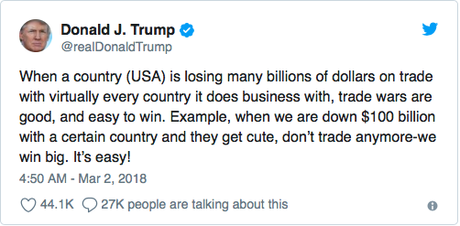
The tweet above by Donald Trump is in response to the backlash on his decision to kick off a trade war. On Thursday, he announced that he would be imposing a 25% tariff on foreign steel entering the United States and a 10% tariff on foreign aluminum.
The tweet shows just how ignorant Trump is to think that it's easy to win a trade war. It may seem easy to a hotel/real estate magnate, because he doesn't depend on exports to make a living -- but the same is not true of many others in our economy. There are many farmers, ranchers, and manufacturers in the United States that depend on exporting their goods to other countries -- and if another country puts a stiff tariff on those goods (in retaliation for the Trump tariffs), they could be devastated.
The higher cost of their goods could send consumers in those other countries to buy goods from a country other than the U.S., and that would cost both profits and jobs here in this country.
And the idea that we could win a trade war by just stopping all trade with those countries is simply ludicrous. For example, most foreign steel comes into the U.S. from Canada, Brazil, China, and Mexico. Is the U.S. going to cease trading with those countries? Of course not! Such a thing would be disastrous for business, jobs, and the economy in general.
Here is what the traditionally conservative Wall Street Journal had to say about Trump's tariffs:
Donald Trump made the biggest policy blunder of his Presidency Thursday by announcing that next week he’ll impose tariffs of 25% on imported steel and 10% on aluminum. This tax increase will punish American workers, invite retaliation that will harm U.S. exports, divide his political coalition at home, anger allies abroad, and undermine his tax and regulatory reforms.
I don't often agree with the Wall Street Journal on economic policy, but this time they are right. Our economy is still fragile and many are still recovering from the Bush recession. Trump's tax plan is bad enough (further widening the gap between the rich and the rest of the country), but the addition of a trade war could seriously damage the economy. It could even trigger a new recession.

